Normally when I write I make jokes. But this morning I find I really don’t feel like joking about any of this right now. I finished working late yesterday afternoon to discover Graham Linehan telling me on Twitter that Twitter had announced a potential new policy that would lead to the ‘immediate silencing’ of my voice. And when I read the proposed policy I realised, with a wash of sudden cold shock, that he was right. Those of you who know me, know me. You know that I have dedicated my entire adult life to thinking about injustice, and to analysing how mechanisms of domination function to destroy the lives of vast numbers of people, because of their sex, or sexual orientation, or socio-economic class, or race. You know I’ve never bothered much with accumulating civic or financial power, because I think we live in a bankrupt neoliberal patriarchal white supremacist environmentally suicidal clusterfuck of a society, and all I really care about is saying that over and over again. And you also know, I hope, that I do this, because I believe, deeply, that all human beings have the right to live meaningful lives in which they have a chance to fulfil their potential, and to be treated with dignity, respect, and social support. But that’s not what Twitter now potentially believes. Twitter believes that people who believe what I believe think something so inexcusable that we shouldn’t be allowed to participate in public political discourse. And this is the story of why that is so.
As many of you also know, there is currently a deep and ongoing dispute between the trans rights movement and feminists who hold a material, sex-based analysis of women’s oppression. The trans rights movement has, over the last 6 or so years, effected an incredibly powerful take-over of the majority of our civic institutions. Four of the UK’s political parties (Conservative, Labour, the LibDems and the Greens) are entirely onboard with trans rights discourse, as are all of our LGBT+ organizations (at national, institutional and student level). When the government did its initial consultation on changes to the Gender Recognition Act, they consulted only with trans rights organization, and accepted, without question, the argument that changes to the definition of what a woman is, and how that impacts public policy, was of no political or material concern to women, and that women’s perspectives shouldn’t be entertained. Groups like Gendered Intelligence have rolled out trans awareness training in schools, social services, health care and universities, and the policy of charities like the Girl Guides is also being determined in consultation only with trans rights organizations, as is the policy of the vast majority of our trade unions (as shown by the TUC vote last month in favour of self-ID.) This sounds tinfoil hat, but unequivocally, it is not. And it should also give us pause when considering the claim that the present trans rights movements is working only in the interests of the most marginalized and politically powerless constituency in history.
While all of this is happening, a large swath of the British public remain completely in the dark about exactly what is happening, or their awareness extends only as far as thinking that the trans rights movement is just – as it presents itself to be – the latest frontier in the extension of liberal human rights. That is, a good chunk of the British public remain completely unaware about the ideology that informs the present iteration of the trans rights movement, and completely unaware of the practical implications of this ideology should it come – as it actually is at a staggering rate – to inform the creation of public and institutional policy.
One of the reasons the public remains so ill-informed about this ideology and its implications is because there has been a near-total freezing of public discourse on this matter. From the moment of its emergence, the current form of the trans rights movement has sought to make all interrogation of its discourse, or the effects of its discourse, an act of illegitimate hate-speech, and has sought to demonize critics, mostly feminist women, as evil TERF-bigots who should be vilified and ignored. I wrote about this tendency in more detail in 2015, and over the intervening years, it has only become more pronounced. The trans rights movement and its allies have exhibited a consistent pattern of no-platforming, refusal to engage with critics (and refusing media appearances in dialogue with critics), harassing institutions that give space to critical voices, and raising twitter mobs to pressure any public or commercial body that commits the sin of publishing wrongthink. In recent weeks alone this has manifested in the dismissal of humanist student Angelos Sofocleous from 3 of his positions for the thought-crime of believing that there are male and female humans, pressuring Brown University to disavow a study investigating whether the dramatic increase in girls transitioning might be due to social contagion, the Girl Guides decision to expel two leaders who had concerns about the inclusion of male-bodied children in groups of Guides, and the successful efforts of one Dr Adrian Harrop to get a billboard removed which had been placed in Liverpool for the Labour Party conference, and which merely stated the biological definition of the word ‘woman.’
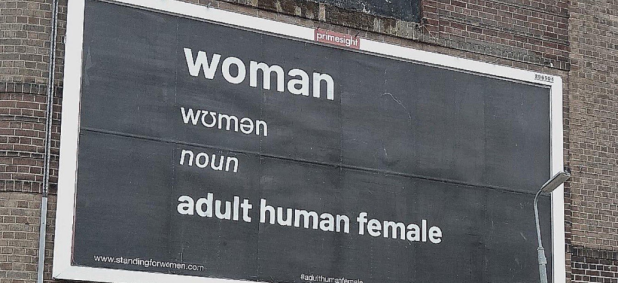
The trans rights movement has effected this near-total silencing by collapsing the present ideology of the trans rights movement into the existence of trans people, and presenting all critique of its ideology as an act of hatred directed at trans people. It variously leverages claims that feminist criticism of its ideology is responsible for the deaths of trans people, that all criticism of its ideology are acts of bigoted ‘transphobia’ analogous with right-wing expressions of homophobia, and by consistently linking the thought of left-wing gender critical feminists and their allies with the alt-right, the Christian right, and with white supremacism. It has been devastating successful at convincing the majority of right-thinking left-leaning people that anyone who raises concerns about the trans rights movement is motivated by nothing but pure baseless bigotry and spite, and that there are no legitimate questions or concerns that need to be given full public consideration before they start determining public policy. The practical upshot of this is that both the left-wing press and the vast majority of academics in the United Kingdom – and other English-speaking nations – are either fervently opposed to allowing criticism to be expressed, or, in many cases, voices of dissent are too scared about the professional consequences of speaking out to put their heads above the parapet. (The writing, and backlash to the writing, of the work of Professor Kathleen Stock, is a prime example of how this is working in the academic context.)
As feminists who hold an analysis of the sex-based oppression of women, we maintain that this is a political, and ideological, disagreement, and that it is the collapsing of criticism of the ideology of the trans rights movement into an act of hate speech directed at trans people, and the silencing of political discourse that this effects, that is democratically illegitimate. The heart of this disagreement is the way trans rights ideology is committed to erasing the fact that humans are sexually dimorphic, the denial of the political importance of the existence of male and female humans, and the effort to ensure that all public policy is executed in line with this denial. One of the great obstacles we face in informing the public about this ideology and its effects is that it’s core ideological structure runs so entirely counter to how everyone who has not been indoctrinated by trans ideology understands the world, that it is incredibly difficult to persuade people that this is a) what the trans rights movement really advocates, and b) that public institutions would be so easily swayed by this ideology and that public policy would end up being made according to its precepts, with almost no debate.
The trans rights movement will tell you that what we say is hatred. If, however, you look at the examples above of people who have been dismissed or censured for committing ‘anti-trans’ thoughtcrimes, what you will see is that, excepting the example of the Littman study, all they did was think that there are male and female humans and that this might be politically or practically important. As I discussed in my last piece, the ideology of the trans rights movement is committed to the thought that whether a person is a man or a woman is only and exclusively a matter of their ‘gender identity’ – that is, that ‘gender identity’ overrides and determines physical sex, and that all public provision that has hitherto been provided on the basis of sex should now be provided on the basis of self-declared gender identity. I don’t want to get bogged down now in the long discussion of the ideological and practical problems of this. You can find an excellent discussion of the incoherence of the concept of gender identity by Rebecca Reilly-Cooper here and here, and I have outlined my analysis of the issues and implications of the erasing sex as a meaningful political category here. What I want to stress here is that I do not consider it to be an act of hatred to think that there are male and female human beings and that that is politically important. Indeed, shockingly, I believe that it is a fact that there are male and female human beings, that the oppression of female humans cannot be explained without understanding and describing this fact. And I think, moreover, that it is actually impossible to give an account of how any system of domination arises and functions if we cannot take account of the interaction between culture and material reality.
By contrast, the trans rights movement, and the form of ‘intersectional’ liberal analysis with which it is aligned – believes that there is no such thing as material reality, that everything is culturally constructed, and this applies also to the existence and perception of human sexual dimorphism. (See my discussion of this here). What this amounts to is the conviction that the existence of male and female humans, and the fact that we can perceive the difference between male and female humans within nanoseconds, isn’t something given by the world and our perception of it, but is, in fact, purely the result of cultural training. (This is equivalent to saying our perception of all objects – trees, river, mountains, roses, tables, whatever… has nothing to do with the existence of objects in the world and our perception of them, but is entirely produced through our concepts and language. That is, it’s a crass, reductive form of a kind of debased misreading of postmodernism which fails to understand the fundamental deconstructive insight that all cognition in humans arises through an interaction between ourselves and the world.) Anyway, the thinking goes, that if we only perceive male and female humans because we have been trained into perceiving male a female humans then, tah-dah, we can just be trained out of it. Because no, there is nothing at all sinister about trying to dictate how humans perceive the world so that it conforms to your political ideology. (Ends justifies the means, right side of history, we are the possessors of the one righteous truth, this doesn’t sound much like ‘queer’ anything to me etc.)
As I suggested in my last piece, trying to structure a political movement around the denial of a fundamental and readily perceptible fact about the world marks the trans rights movement as fundamentally divergent from all previous civil rights movements. Campaigning for the removal of value-judgements and systemic discriminations based on differences between peoples is not the same as attempting to enforce the belief that such differences do not exist and must not be perceived. The totalitarian political tactics of the trans rights movement are not, therefore, an accident. Rather, they follow necessarily from the fact that attempting to legislate that human beings must not perceive a fact about the world that we do, in fact, all perceive, is totalitarian to its very bones. (Orwell was right, the existence of material facts is a fundamental bulwark against totalitarian thought control. (Trump is President of the United States FFS, how are you people still thinking that that all this ‘post-truthiness’ is liberation????)). The reason, therefore, why the trans rights movement cannot allow there to be a public discussion around its political ideology and its implications is because if people really understood that it’s political ideology is committed to denying that there are male and female humans, then the collective ‘What the Actual Living Fuck?’ would be so deafening that the whole political project would be dead in the water. So, instead, it has had to be achieved by a) a ton of behind-the-scenes collusion between trans rights organization and individuals in positions of political and civic power and, b) silencing public interrogation by bullying dissenters, hamstringing the press and public bodies, and making sure that everyone understands the very high social sanctions for speaking out.
So enter Twitter. Given the extent to which public discourse has been closed down around this issue, there are presently only a few significant online public spaces where there is anything resembling an open discussion around the nature and political implications of the trans rights movement. One of these is Twitter and the other the ‘Feminism and Women’s Rights’ boards on Mumsnet. As I’ve said before, it’s no accident that women who have created and fed other humans with their bodies are not buying this ‘bodies are politically irrelevant’ business – in fact, it’s an axiomatic non-accident, because what is at stake here is all about the political importance of reproduction, and the immemorial patriarchal erasure of the mother. ‘Mumsnet Towers’ have done a sterling job, in the face of persistent harassment by the trans rights movement, of defending the rights of women and mothers to name their bodies, the political importance of their bodies, and to analyse the political stakes of the erasure the trans rights movement is currently effecting. Unlike Twitter, however, Mumsnet caters to a particular segment of the population. It is not, as Twitter is, the 21st century virtual equivalent of the Greek agora – the public square where people (well men) came together to debate and discuss the political and philosophical issues thrown up by running their early, democratic city states.
For better or worse, Twitter is where we now do democracy – on a global (although very much tilted, like all global power, to the Western) scale. When the internet first took over our collective lives, there was a good deal of talk about its ‘democratising’ potential – and while that utopian promise has inevitably been corrupted by commerce, and, as in the case of Cambridge Analytica, by the collusion between social media corporations and nefarious political power, it’s not complete hogwash. For all its ills, the great virtue of Twitter is that anyone with a computer and a phoneline can get on there and start shouting. It has the capacity to connect people in power, and people with public voices, with people who have particular political interests, expertise and concerns. And it has the power, sometimes, to actually give direct political voice to people who otherwise would have none.
The resurgence of feminist activism at the beginning of this decade, was down, substantially, to Twitter. Almost the entirety of my feminist political life – the friendships I’ve made, the meetings I’ve attended, the writing I have been empowered to do and the audience it has found – has been down, substantially, to Twitter. The expression and organization of resistance to the impact of trans rights activism on the lives of women, girls, lesbians, and homosexual men, is organized, substantially, on Twitter. When people find themselves confounded or shocked by something they hear briefly on the news – that Lilly Madigan has become a Labour Party Women’s Officer, that a trans woman has assaulted four women in a female jail, that Pips Bunce has won an award for being a female executive although he is a transvestite and not actually a female person – they come to Twitter. And on Twitter they find a LOT of people talking about this. Serious, smart, well-informed, researched up-the-wazoo women and men who have serious theoretical and political objections to a discourse that is holding our political life in a kind of stunned zombie-thrall. And Twitter knows this. And Twitter wants it to stop.
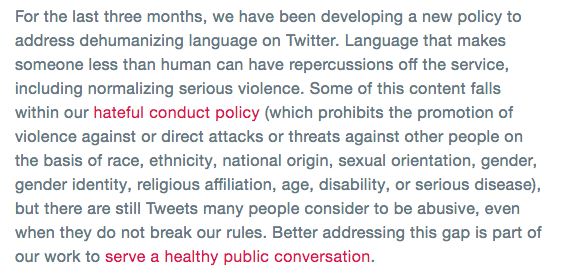
The proposed policy that Twitter announced yesterday would pass quietly under the nose of anyone who is not well-versed in this conflict, and in its ideological and rhetorical tropes. Despite the fact that Twitter has tolerated women being inundated with death and rape-threats – most famously in response to Caroline Criado-Perez having the temerity to campaign for there to be one woman left on a British banknote – Twitter has now decided its policy on policing hate-speech needs to be tightened up. It has decided that hate-speech is defined by dehumanizing language – fair enough – and then decided that there are two principle examples of this kind of dehumanizing speech. The first, uncontroversially, is comparing humans to animals or viruses (vermin, cockroaches, plagues etc.) So, no problem there – it’s an much-used and well-documented trope of othering groups of people, and it never goes anywhere good. The second – and this is where a MASSIVE alarm-bell starts ringing – is “reducing groups to their genitalia.” Something Twitter describes as a form of ‘mechanistic’ dehumanization.
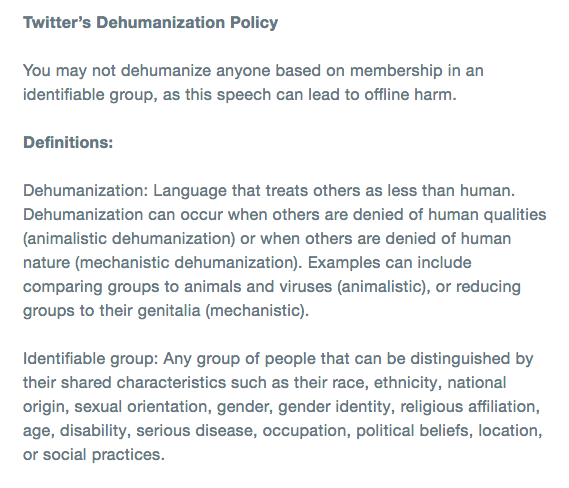
Okay. So, first off. I’m pretty well-versed in the types of tropes that have been used in historic acts of dehumanization against groups of people, and as far as I know, ‘reducing people to their genitalia’ is not, and has never been, a form of widely used dehumanization, or a precursor to systemic violence, against any group of people. Using genital-based insults aimed at individuals is a pretty standard form of English-contempt-giving (‘dick’ ‘prick’ ‘cunt’ ‘twat’ ‘cockwomble’ etc), but these types of insults are never used to present an entire groups as either a threat, or to dehumanize an entire groups in order to legitimize violence against them. So what the hell is going on here? As anyone versed in the rhetoric of the trans rights movement will immediately recognize, ‘reducing someone to their genitals’ is one of the used-like-clockwork phrases trans rights activists turn out when arguing about why it’s not okay to distinguish male from female humans, or why it’s ‘problematic’ to think the definition of ‘woman’ has something to do with being biologically female. It’s a totally bogus argument because it relies on collapsing the distinction between ‘something being defined by’ and ‘something being reduced to’ – to say that being a woman has something to do with having the sexual characteristics of a female is not to reduce a woman to being only those characteristics.
And what’s more, the reason for arguing this is transparently not because the trans rights movement is unduly concerned about women being reduced to dehumanizing body parts or functions. In the name of inclusivity they have promoted the use of phrases like ‘uterus-havers,’ ‘cervix-havers,’ ‘menstruators’ and in one particularly charming example, ‘bleeders.’ The function of this argument, that is, is purely political. And it’s political function is to claim that it is morally reprehensible to distinguish male and female humans, in the service or arguing that no public policy, or organization of public space, can legitimately be made of the basis of that distinction. In the case of the Twitter policy here, this function is further amplified by the fact that Twitter apparently recognises that both ‘gender’ and ‘gender identity’ are acceptable ways of identifying a group. But it does not recognise that sex is. (That is, it will allow us to talk about ‘women’ and ‘men’ because the category of ‘women’ potentially includes male people who identify as women. But it will not allow us to talk about female people).
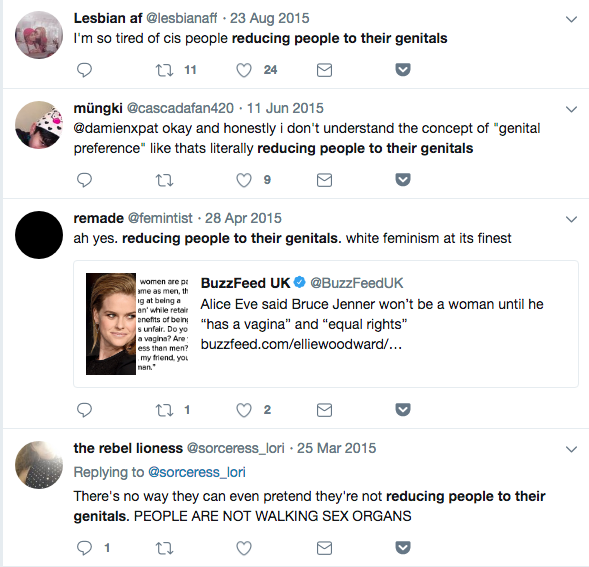
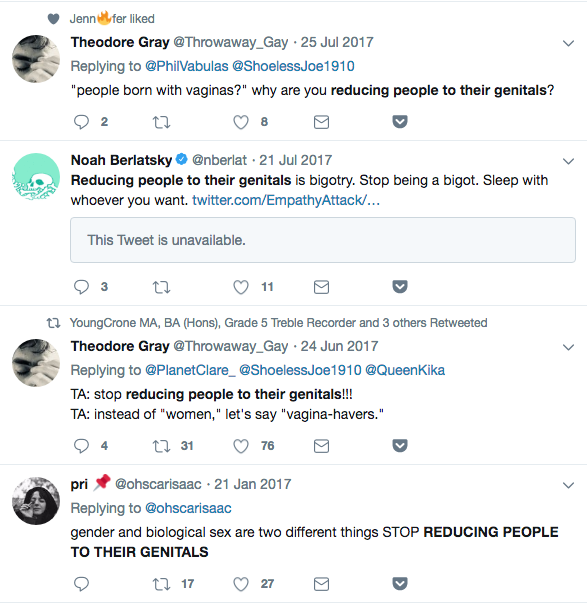
When Graham Linehan told me that my voice would be silenced by the new Twitter policy, this is what he was talking about. The political line I, and many other women, have been trying to defend, is the political importance of the difference between male and female humans. The reason why we are defending this line is not because we hate trans women. We have no political argument with transitioned trans women who have committed themselves to the social and medical process of living amongst women. But we have serious concerns about changing the definition of a woman to include ‘any male person who simply asserts that he is a woman.’ And the reason why we’re concerned about that is because male people pose a very significant statistical danger to female people, and there is no reason to believe – and no empirical evidence to support the idea – that male people cease to commit male-pattern violence against women and children simply because they say that they are women. Nor, moreover, has the trans rights movement expressed the slightest shred of interest in thinking about the way that a policy of fundamentalist self-identification is manifestly open to abuse by predatory men and men who want access to children.
The other major concern we have is that feminism is fundamentally a political movement dedicated to articulating the interests of female people, and in explaining why female people are oppressed as female people. Women are oppressed by gender, but they are not, fundamentally, oppressed because of the way they perform their gender. Men rape female people. Men exercise violent coercive control over female people. Foetuses are aborted because they are female. Clitorises are cut out because they are the organs of sexual pleasure of female people. Women are paid less because they are female. And none of this can be avoided, or changed, by the way women do their gendering, or by trying to coerce everyone into thinking that female people do not exist. All this will achieve is to make the speaking of the sex-based oppression of women impossible, which is exactly what we’ve been saying is the threat hiding in plain sight in trans ideology this whole damn time. What Twitter is doing, therefore, by seeking to ban as hate-speech the actually non-existent dehumanization of groups of people by ‘reducing them to their genitals,’ is to prevent the speaking of the feminist analysis of the oppression of women, which they just happen to have framed in precisely the language used by the trans rights movement. That is, Twitter is trying to ban women from the only major public democratic space where we are more-or-less freely still able to express our political criticism against a massive assault on our rights – and it is seeking to do so explicitly in the interests of the trans rights movement.
I have been running around on Twitter for the last few months, saying, repeatedly, to pretty much anyone that will listen, that the trans rights movement is the most totalitarian thing I have seen in my entire life – and yet, somehow, I still don’t believe, even though we are so far off the political map of normal, that any of this is really happening. That, for all the political complicity, and manifest misogyny, and the incessant, day-in-day-out, drum beat of violence and disrespect aimed at women, that we are seriously in a position when feminist women could be ejected, en masse, from the global public square, for saying that female people are oppressed as female people and that that matters. Even though I know, and have been saying, for the last five years, that the fundamental structure of trans rights discourse threatens to make feminist speech unsayable, I still somehow don’t believe that they are really trying to frame a policy to make us stop saying it. And yet, I can’t help coming to the conclusion that they really are. For those of you out there still sitting on the fence, or who still believe that I, and everyone opposing this ‘civil rights movement’, is just a nasty evil hate-mongering bigot, please, if you give one shit about women and the protection of women, wake-the-fuck-up. This is actually happening, it’s scary as shit, and we may well be running out of time. This is what woman-hating totalitarianism looks like. This is not a fucking drill.

